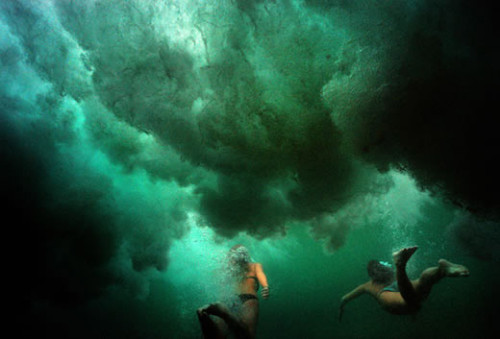
Narelle Autio, photography.
“A generalized sense of paranoia pervades modern culture. The loss of human solidarity, the split within the self and the split between the self and others, has led to a private and public suspiciousness on a greater scale than ever before.”
Rob Weatherill
“Any survey of imperialism and its adversaries must note the pathetic role of most of the US and European left in recent years. Even in the most repressive moments of the Cold War, large anti-war movements challenged militarism, aggression, and war. But those movements have shriveled before indifference and ideological confusion. In the post-Soviet era, imperialism cynically appropriated the language of human rights and manipulated or bred an entire generation of non-governmental organizations (NGOs) with innocuous, seemingly socially conscious banners, but disruptive missions. So-called ‘color’ revolutions proliferated, paradoxically supported and directed by a host of government and private-capital funded NGOs. These organizations promoted a brand of ‘democracy’ that mobilized Western-oriented liberals and Western culture-mesmerized youth against established, often election-legitimized governments. Most of the Western left naively applauded and uncritically supported these actions with no understanding of the forces at play.
Much of the European and US left passively watched the dismantling of Yugoslavia–blinded by NATO proclamations about self-determination and ethnic violence, as if kindling the fires of extreme nationalism would produce anything other than separatism and hatred. In a masterful assault on credibility, NATO bombs were interpreted as enforcing human rights in Serbia and Kosovo.
The imperialist game of deception proved to work so well that it has been repeated again and again, in Iraq, Libya, Ukraine, and Syria, to only name a few.”
Zoltan Zigedy
“{Death is} an appointment to which we are always called…but which eludes us.”
Jacques Lacan
There is a pervasive feeling of inauthenticity running through contemporary Western society. A sense of distrust, even of oneself. It breeds a kind of a paranoia, but not the conventional idea of paranoia, but something closer to an acute hyper-anxiety. There is the obvious ersatz quality of things; everything from cheap pocket combs to cheap shower curtain fixtures, all the the way to the lack of craftsmanship in leather goods, shoes, bags etc. But there is also a twofold phenomenon that is one part indifferent education, or just bad education, and the onslaught of data and information. I often think those without any formal education are far better off than the poorly educated. For today the poorly educated are excessively educated, only poorly. Meaning they know a LOT of things wrongly. They know huge amounts of nearly useless information, and even that is usually incorrect.
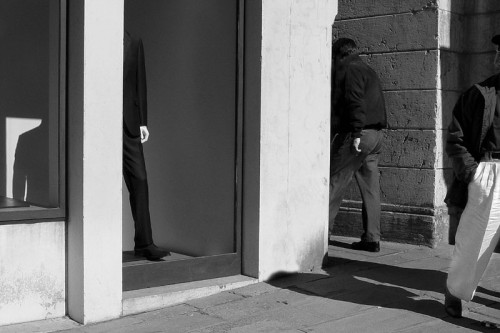
Siegfried Hansen, photography.
There is no sense of integrated learning. The loss of curiosity has resulted in an embrace of ever narrower fields of study, or expertise. And usually in technical fields its reached a point where one literally cannot have a conversation with a scientist about anything but his narrow field of expertise. And what that scientist knows, or suspects, is that he or she is unable to integrate into wider fields of study. For science is driven not by curiosity as much as by profit. Science for the average Westerner today means an embrace of deeply reactionary political positions and an embrace of authority. Authority has been granted science, now, for a hundred years at least. But the emotional attachment to the authority of science is something that arose after WW1 I think, and then kicked in another register again after WW2. The non scientist is attached to the authority of science even more than the scientist is, and this submission to the authority is more pronounced and more intractable. Science is associated with rational no nonsense toughness. The fear of being emasculated is projected out into a fear of being taken advantage of, which is seen as feminine, or weak. The fear is associated with being found out, or being wrong, which is perceived as much the same thing. It is seen as a sign of weakness to change one’s position. Ambiguity is weak, girlish. Be decisive, be firm. Make a choice and stick to it. This is how little boys are taught.
“The far seeing compassionate One has permitted even that which is forbidden.”
Santideva (Wallace & Wallace tr. from Tibetan)

Antonello da Messina, Dead Christ Supported by Angel (detail), 1475.
The postmodern conformism I see is one which resembles the enlisting in an army or police force, metaphorically. The uniform of the new bourgeoisie is there to allow identification with this vast immaterial *group* that serves as an ego-ideal (in Freudian terms). Lacan saw regressive utopian fantasies as linked with the dissolution of patriarchal authority. The white westerner is today, especially men, suffering an acute anxiety over impotence and the resurgent misogyny in popular culture speaks to this. There is a psychoanalytic paradox at the heart of this; for the individual today, that self brand, is one both submitting to the group construct, but also one in a position not unlike that of the young child. Primary narcissism. Everything is about me. I am both cause and effect of EVERYTHING. Rob Weatherill calls this the ‘movement between subjectivity and asubjectivity’. It is only when this infantile belief in an ideal Mother is found, a pre-Oedipal desire, is the subject allowed to atrophy.

Ambroise Tezenas, photography.
In culture, this oscillation between abject conformity, and narcissistic desire, is played out in stories of self aggrandizement and a splitting and projection of our bad selves onto the Other. The Oscar is awarded to Birdman, almost the perfect example of infantile narcissism, and schizophrenic anxiety. The lead character talks to himself, a construction based on fiction of exaggerated heroism to begin with. One in a uniform.
The Hollywood films of today are uniformaly infantile; Boyhood, Birdman, The Grand Budapest Hotel…these films are read as mythology almost, yet they are childish in theme and in emotional color. Lacan thought that we will always feel we are missing something. This is the legacy of the Oedipal narrative, one that previously was managed by the Father who, in fact, was the cause of it. In artworks, from Shakespeare to Dante, or Dostoyevski even, the search was the generative engine that illuminated something previously hidden. This is Homer, as well. In today’s popular culture (in all culture, today, really) there is no search, there is only a return to the infantile creation of an ideal Mother (not anything to do with a real Mother), a protector of childish narcissistic desire. Marvell comics are many things, if deconstructed, among them a childish fantasy of omnipotence. In the art of previous times, up through modernism, the narrative was a way to mimetically guide our understanding of failure and frustration, of defeat and suffering. There was a reconciliation, which was in a sense the reason for stories in the first place. Now, couple to this infantilization a secondary projecting of unreconciled material, and this uncertain subjectivity, and you have the rise of stigmatizing and shaming, of racism and rape. And this projection is of necessity violent.

Meng Zhigang
There has been a division within much critical writing on culture that revolves around abandoning the realities of class, as well as replacing masculine centered stories, with new masculine centered stories but ones which allow women to perform the role of a man. This is a vastly complex topic, and not one I can do justice too, here. But the projecting of white supremacism within a feminist (sic) discourse can take, too often, a caricatured form of aggression toward women of color and poor women of any color (Patricia Arquette’s Oscar speech is an example). This is perfectly in keeping with the sentimentalism of Hollywood’s new child-like films. For sentimentality masks a violence, and often one that is gendered. The new sadism in Hollywood film and TV is connected, again, to the regression to primary narcissism, to a melding with earlier positions of power and authority (Colonial mostly) in which aggression is read as heroic, and connected to the mastery of science of rationality. Torturers are no-nonsense sort of guys (or girls). Decisive and without ambiguity, and therefore infantile, and immediate. Instant gratification is the desire of the infant.
Anxiety, it should be remembered has a link with desire, and desire with image. That is the mirror reflection that looks back at us. The subject knows it exists in the gaze looking back at it. This is the Mother’s gaze at the infant, and later the gaze of the totem or shrine, the artwork even. That which looks over us, upon us. Consistency of self is reinforced. The infant subject puts that Other, its image, to use and attributes the consistency of the world to it (for the infant is at this stage without much control even of body). The infant, and later the child, sees something (narrates something) in or from the Other about itself. The child’s specialness comes from being looked at. Now Lacan saw the child giving a function to the Other as that which provides a unity to the child, but I think it is more, it gives it a narrative life as well. The dawn of language is in one’s own first story. The need for story accelerates the acquisition of language. But the function of the Other is also the dawn of anxiety. And this is a secret. It is the secret of pre-Oedipal consciousness; the child’s world is held together by the gaze of the Other. And keeping that hidden creates anxiety. One doesn’t want to be found out. The group must not know the truth, that *I* am only there because the Other looks over me. Someone to watch over me.
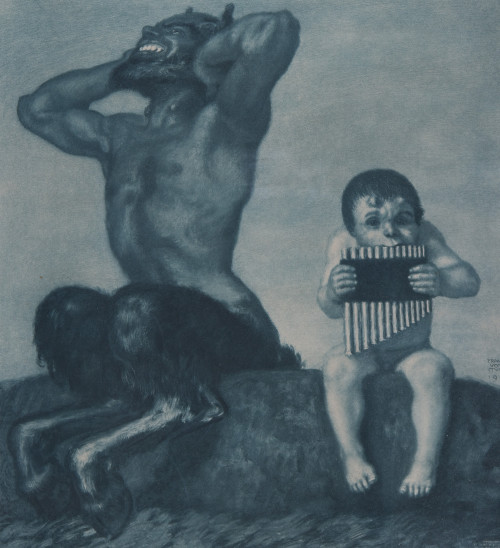
Franz Von Stuck. Heliogravur.
The need for instant gratification grows more acute and anxiety more acute. So, that sense of the missed appointment to which we are called, Death, also, of course, intimately linked with desire. And with story. And with the uncanny. The primordial Father, the creator of prohibitions, of taboos, is also the person who, for the child, has something NOT lacking. A phallus. This is the Freudian/Lacanian scenario. The point here, though, is that the experience of absence is connected to the development of narrative. Children’s stories are now cleansed of meaning. The greatness of the Brother’s Grimm, for example, was in introducing a material world in which a place was given for feelings of secret pain and anxiety. Climb the bean stalk. Beware the hut of the Old Woman in the forest. Anxiety in Freud was originally seen as insufficient sexual discharge (of a sort), but later he believed it was a reaction to danger, and more, to separation. And the primary separation is birth. So again, the childish formations of the psyche relate always, or return always, to anxiety. And they are mediated — depending on the theory to which one subscribes –by the secrets of the Other. And that secret is linked to the experience of absence, but also being watched. In the regressive infantilized cultural works of today, there can be no gaze returned, nor can there be that space for re-narrating the story of our selves. Hence, projection, violence, and self doubt. And a self doubt masked, because of the terror it holds, as absolute confidence. I am ‘authority’, ‘rationality’, and ‘domination’. Mastery. And mastery is probably always incomplete. The lack of completion is, then, again a source of anxiety.
The depiction of sexual mastery has become more pathologized in Hollywood product, and depictions of love more sentimental. On the one side there is a growing sentimentality, albeit a weirdly banal sentimentality (Boyhood) while sexual mastery becomes more sadistic. The particulars of different characters is almost beside the point, because the entire meta discourse of culture is taking place, I feel, in a topos of extreme childishness. And the child cannot be a parent, and real mothers or fathers must carry out parodies of earlier versions of parenting because they don’t and cannot *feel* like adults. One of the disturbing qualities about Boyhood was how surreal the banality became after while. I kept thinking, this is like a really subtle, but bad, acid trip. A universe where everyone was playing dress up as if they were five years old. But again, in the material world I suspect the role of Mother has become more disfigured and mutilated because of the odd confluence of women-as-not-serious, women as-the-new-men, and the inability to give up one’s own childhood. For fathers, there are ever new sources of physical mastery, but such cartoon activities as bar fights or weekend football matches only serve to make more obvious the feelings of incompleteness. But mothers are still more connected to their children, and hence have a more concentrated unease or discomfort about *how* to be a Mother. How to not pass on to the daughter the not being taken seriously, or the sublimated rage against men, or the incorporation of thousands of years of being dominated.
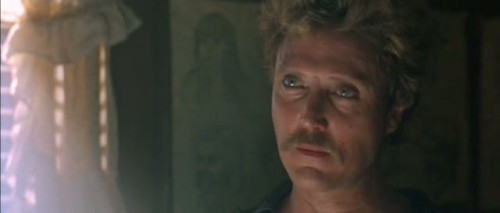
“At Close Range” (1986). James Foley, dr.
Behind all these fears and anxieties though are the more primal and originary experiences of absence, lack, and separation. There is an unbearable suffering, an unbearable sense of unfairness and longing for order today, for something now gone even if people don’t quite know what it was. The sense that an old order existed, a responsible order of beliefs that functioned like a good parent, like that ideal Uncle that nobody has. Instead we all have Hitchcock’s Uncle (Joseph Cotton) in Shadow of a Doubt. There were eruptions of reality in popular culture over the last fifty years; from Aldrich’s Whatever Happened to Baby Jane, to Hitchcock, to John Huston in Chinatown, or Terry O’Quinn as Jerry Blake in The Stepfather, or Christopher Walken in At Close Range; these were the authentic parents and in all cases a certain collective recognition took place.
The significant aspect here, though, has to do with how this infantile narcissist navigates through life. It is easy to forget just how infantile George W. Bush was, or Joe Biden, or Bill Clinton. How narcissistic and repressed is Obama. Rob Weatherill quotes Wilhem Reich, at this point, on his rejection of Oedipus, but retaining the authoritarian patriarchy, only in the form of the state.
“If one penetrates…deeper into the biologic substratum of the human animal one always discovers the deepest layer which we call the biologic core. In this core under favourable conditions, man is essentially an honest, industrious, loving and if motivated, rationally hating human being.”
Reich

Anna Fox, photography.
The nature of authority is germane at every level today because of the fact that indeed, the traditional bourgeois father-role is gone, and Church authority has wanted (in the West) and the dutiful apprenticeships served by many prior to the Industrial revolution are also gone, but this is suggestive of that longing for a misplaced encounter. It is not just personal, it is historical. Jose Brunner points out; “The recollection of what is forgotten, or excluded from conventional discourse is said to be an accurate and complete representation of reality.” This in the emancipatory element, this claim to truth, a hidden truth both personal and historical. Political revolution, however, has a hard time when, increasingly, the masses are weighted down by the constant repetitions of primary narcissism. Freud said, compulsions don’t want to be remembered. So, what is the nature of the new super-ego? In a sense, I imagine those cartoon depictions of children running a prison for other children (or did I dream that cartoon?)…no matter, for the sense of today’s celebrities and movie stars playing dress up is a true reflection of their childish anxities. Sean Penn’s racist insult at the Oscars was more an act of the insecure child wanting to participate in the adult conversation. What better way to show masculine maturity than casually toss off racist asides. I am reminded of David Foster Wallace’s remark that his generation felt like teenagers at a party that got out of control and longed for the parents to return home. Today’s super-ego lacks a conscience. In fact the super-ego was the conscience, in one sense. But without the obvious Patriarchal authority to set limits, even if irrational, the child now is returned to a default subject position of pre-Oedipal desire.
“The old inhibiting super-ego has been replaced by a tyrannical new one”
Rob Weatherill.
Here one runs up against the Lacanian interpretation of Freud’s Death Instinct. The missed appointment. The child who is not picked up after school. The immature child, even very young child, still orients his or herself around immediate gratification. The child must keep its secret hidden, must not allow such vulnerability to get out. The post modern adult functions a lot like a scared child, one who is acutely aware that his or her own narrative of development is pinned to something just out of reach, consciously. Who is watching over me?
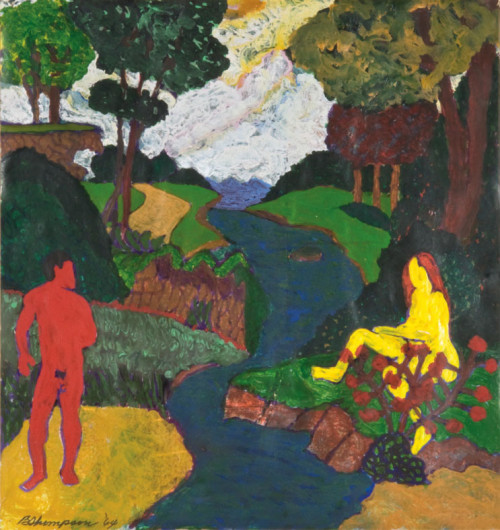
Bob Thompson
The childish psyche is one of constant over compensation. The fear of Death is there at the very origin of our construction of identity. The primacy of the gaze is probably linked to the over compensatory need for shaming. The group, the manufactured Mother, and the child in uniform, are always working toward consensus, and the easiest strategy for that is to keep finding scapegoats. Look over there, don’t look at me.
Except, LOOK AT ME TOO!
The non exhibitionistic narcissist seems the somewhat unique product of advanced capitalism. The rise is in a militarized police, one given to almost arbitrary attacks on the most vulnerable, poor inner city black youth, transpeople, the homeless, is part of this group super ego, an immature and highly anxious psychic formation.
Here I feel is one of the crux issues of contemporary society in the West. Dostoyevski keeps looming as the signal voice of prophecy. Guilt is there before any crime. In fact, crime is a sort of release. What is forbidden is internalized, is misunderstood, is vague, and the only rational answer is accept the forbidden by overcoming it. If one accepts the authority of the forbidden, then an unbearable tension is created. And only transgression can release, temporarily, such tension. I am guilty for a reason. At least I know what I did. Hence the contemporary obsession with confession, and with remorse. The child commits crimes of fantasy. This is Freud’s analysis, and hence incorporates the guilt. I want the parents to come home and restore order. AND to punish us all, punish the group. Children anticipate punishment. The paranoid society is today, under mass surveillance, always guilty. The guilty group projects their guilty bad selves outward. Capitalism, whose driving engine is exploitation, naturally trends toward the creating of enemies. Muslims, Russians, Viet Cong or Communists of any sort. They are evil. This vaguely religious trope tossed like a cheap blanket over all this is currently indispensable for the infantile psyche. But there are complexities in this that I think need mentioning. D.H. Winnicott suggested that not locating the source of guilt can cause a feeling of madness, hence the expedient activity of creating limited crimes. And then, hence, the need to confess to them. The childish psyche cannot admit the real secret (which may or may not be felt as guilt) but can comfortably admit to lesser offenses. The post modern mental plea bargain.
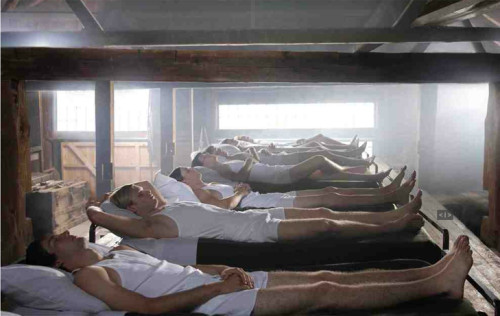
Anthony Goicolea, photograhy.
There is mastery in crime, though, too. Bad boys are sexy. Bad girls are sexy. The erotic component in transgression is obvious, and yet, such eroticism produces anxiety. Couple all this to the commodity culture of today, and it is easy to see how increasingly fragile the psyche has become. The child never feels unity or completion. The well adjusted adult has simply learned how to cope with incompletion. Adorno, in his late lectures on History & Freedom, wrote that…“while we imagine that we act as ourselves, in reality we act to a great extent as the agents of our own functions.” This is what Marx meant by *character masks*. The increasing bureaucratization of daily life, and a, in material terms, ever more restricted emotional life in the West, has resulted in ever more carefully conceived cultural products. Radical artworks are harder to make, harder to find. Those who once were the gatekeepers to high culture are now the anxious bookeepers of Empire. The works validated by the system are those most conducive to the childish narcissist. Adorno in the same lecture wrote…“For this identity is completely misconceived. We may say that the measure of its failure is one we see everywhere today. It takes the form of that infantility among adults that surfaces at its most extreme where the adults are at their most grown-up. That is to say, it manifests itself when they have rid themselves of the last trace of their childhood dreams and have completely surrendered to the business of self preservation that has lost its ultimate purpose and become a fetish.”
It is worth noting that Adorno pointed to Mahler as an example of artist who resisted the dictates of false consciousness. Today, the exclusionary principle in contemporary culture is far more advanced than in Mahler’s time, and indeed, far more advanced than when Adorno wrote this lecture (1964). The infantile psyche, ever afraid of being found out in its incompletness, in turn cannot afford to gaze too long at certain things. This child/adult must look away from many things, especially about itself. The creation of identity brands affords a modicum of temporary relief, but even that fleeting relief would be negated if the individual were to gaze too long on the poverty and suffering and madness all around him or her.

Andrew Dadson
The relative privilege of almost all Westerners is the largest blind spot. But there are others, certainly. Adorno saw “disenchantment, making the world scientific, the increasing encroachments of science on the world, a process that subjects the phenomena of the world incrementally to the laws of science — all that is a mortal threat to freedom.” The coercive nature of this idea of “progress” is felt daily, and culturally the growing blandness of infantile narratives about infantile subjects places the anxieties of the subject into stark relief. The real story is the one most hidden, the secret story that hinges on and is dependent upon the gaze of the Other. But that secret sets in motion a narrative without end, or rather a narrative that must end in death. No story does not end in death. All stories are crime stories, and all stories are about homesickness, but these things are tied to that appointment we can never keep. That sense of having missed something, or of having the best party be the next one, or that somehow something is being kept from us is more acute today than ever before I think. One of my early formative memories was discovering some photos of Genet’s plays in an old Evergreen Press paperback. I was perhaps twelve and I knew something then about the importance of real artworks. For this was the secret history of the world that was being kept from me. I knew this because I recognized it. It was a memory of the dawning of the story of myself. If one never is so exposed, one must find that story in other places, other totems, other people with stories to tell. The purpose of Western capitalist society is to erase ALL stories and replace them with commercials, or, in other words, with anti-stories.

Great post. I’m particularly interested in what you describe as the infantile narcissism of Birdman, I think this is very insightful. I had the acute sense of watching an horrific, Kleinian nightmare of projective identification during this film, and of the sickness of the sensibility at its core. Its various elements all seemed to combine, in the manner of a self-fulfilling prophecy, in the service of the maintenance of a psychotic, hateful personality, whose subjectivity we are assumed to feel affinity with! I found it nauseating. Your comments about the narrow, white, masculine worldview of contemporary film production more generally are quite accurate, but I haven’t felt it as nakedly or as strongly as with Birdman. What I wonder about is, with respect to the ruling class, what is the source of the anxiety against which these narcissistic defenses are brought to bear?
@Oisin………
Great comment. Thats exactly what it is, exactly. Rob Weatherill in fact, I think, does a Kleinian breakdown of projection …..and it does fit. Its an interesting comparison with say, The Double, Dostoyevksi. The uses to which splitting is put, or investigated. And what I found with Birdman, as well, was this other creepy sort of cleverness, or rather, a creepy smug cleverness. Ed Norton has become just intolerable as an actor. Everything he does is about his own sense of his own greatness. He is the opposite of an actor like Brando for example, who was always in the process of trying to lose himself. Or watch mark rylance in Wolf Hall. Now this is far from a great film (well, mini series), but because of Rylance it takes on this deeper quality of something almost tragic. Rylance is preternaturally gifted. Its not technique, or even intelligence. Its those things, too, but it is something else very hard to describe. Ive been thinking a lot about him in that role as thomas cromwell. On one level he does so little. And yet you are drawn into that narrative in deep way that I think is precisely mimesis….you must have this dialogue with yourself . He …Rylance….is the dopelganger of the viewer. With Norton, you are pushed away. Its psychic teflon. But that core sickness in Birdman is an apt description.
” In a sense, I imagine those cartoon depictions of children running a prison for other children (or did I dream that cartoon?)…”
Stanford Prison experiment….
V. interesting post! I read Weatherill’s essay on psychoanalysis versus neuroscience .. the latter being what one friend of mine referred to recently as “couch therapy”. Weatherill calls it “the cure through love”, touching the subject’s earliest love-hate conflicts in life. So I suppose if you’re looking for a cure for everything that ails us, from bad films to the Orwellian nightmare we’re currently living, it may be that
” In a sense, I imagine those cartoon depictions of children running a prison for other children (or did I dream that cartoon?)…”
Also a vignette like this in Ursula K. Le Guin’s The Dispossessed…